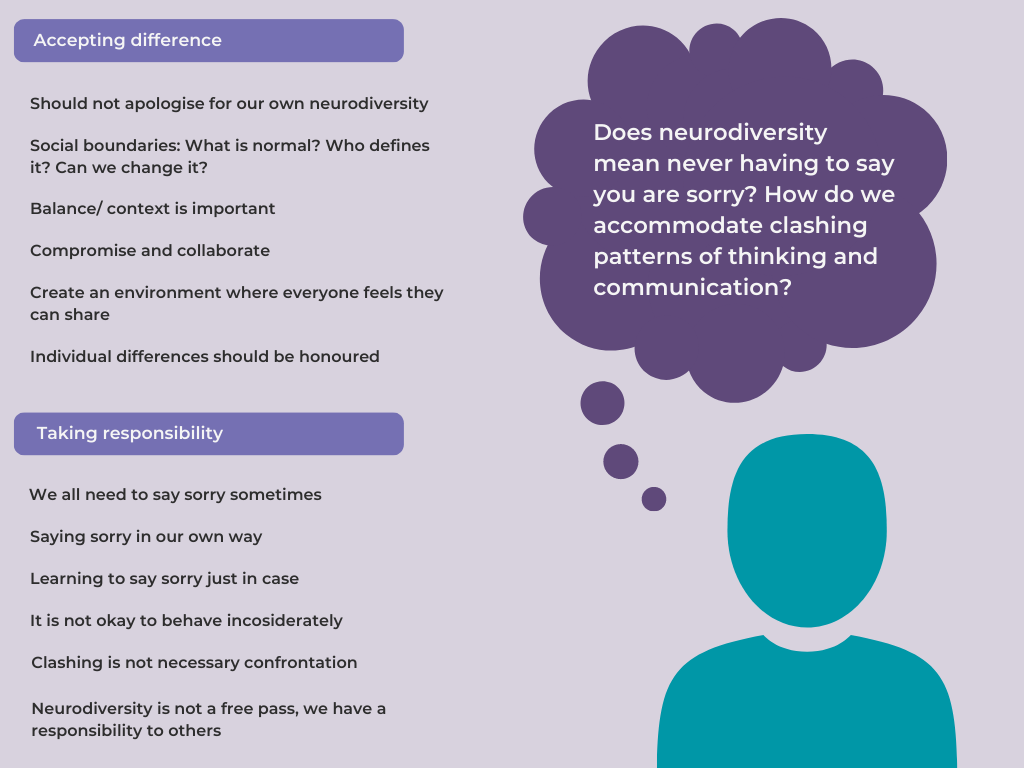Posted 23 Sep 2019
Does neurodiversity mean never having to say you’re sorry?
Does neurodiversity mean never having to say you are sorry? How do we accommodate clashing patterns of thinking and communication?
First things first, there is no one answer to this. It is complicated, just like anything to do with the human brain. There are however, some clear ‘yes’s and some clear ‘no’s. A lot of it is down to control, and who has the resources to make the accommodation.
Should someone have to apologise for something they have little or no control over? What about when someone with Tourette Syndrome has a tic that causes them to swear at someone? Or when someone with Dyslexia in the work place consistently fails to meet work deadlines, should they apologise? Are you thinking yes or no to these? We think it could be either based on the circumstances.

What about if it was a physical condition…
Would you ask someone with a broken arm to apologise if they could not write up a report? The answer is probably no … and you would probably find that employers would have made greater accommodations for those with physical conditions.
But why?
With a broken arm, it is easy to see what is going on via the use of X-rays and examinations. When it comes to understanding neurodiversity however, it requires more effort and patience to understand what makes someone’s brain tick slightly differently. Could it be that we are just lazy… out of sight out of mind, if you cannot see it you do not need to accommodate for it? Now, this is of course not the case for the majority and we have come leaps and bounds in the last decade, supporting those in the neurodiverse community helping them to flourish and really own their strengths. However, we still have a long way to go for neurodiversity to get the universal recognition it deserves. I am not just talking about recognition for the need (and legality) of reasonable adjustments, I am talking about recognising the strengths and sheer brilliance that can be brought to the table by someone who can see things differently to everyone sat round that same table. Why is there need for an apology from the same mind that creates out of the box thinking that we need to evolve and grow as a species?
I do not think apologies should be mandatory behaviour when it comes to clashes in thinking. As discussed at our Celebrating Neurodiversity conference earlier this year, clashing does not always mean confrontation. Are we so opposed to different ways of thinking that we must shame those who do think differently to us, by asking for an apology when they express their thought processes? Clashes in thought and processing are opportunities to learn. If everyone had the same thought processes and behaviour, we would never learn anything new (and the world would be pretty boring).
However, sometimes clashes of thinking affect others, detrimentally. A late document may cause someone else to miss a deadline, or might cost a sale. An observation without social filters might touch a nerve. At our recent conference, it was discussed that we should be taking responsibility for our actions and that we all need to apologise sometimes. Sometimes a quick apology and move on is the best answer, however we do not want to set up a situation where shame is embedded and people feel diminished and subservient.
Support neurodiverse colleagues, agree boundaries and parameters up front. Let us predict what kind of difficulties might emerge and decide who has the most resources for changing. Can a team accept a little too much directness from an autistic colleague in return for high quality finessed work? Are there occasions where lateness will be okay provided there is advance warning? When we know someone has uncontrollable observational tics can we agree not to take offence and to ignore these without embarrassment? What does this cost us, really? These are some of the ‘grey area’ boundaries that we work on in our coaching and co-coaching sessions.
Environments should be accommodating to the individual, which subsequently should reduce clashing. There are support systems you can put in place, in-work coaching and reasonable adjustments, to support a neurodiverse person in their work place. These should help reduce clashes, but if you are experiencing clashes regularly, it is time to review the boundaries and agree a system – what do we do when there is a meltdown? How shall we recover from an over-passionate frustration?
You cannot really define normal, one ‘normal’ simply does not exist. Sure, there are patterns of behaviour and thinking that occur more regularly, and there is a general consensus for right and wrong, but is there ‘normal’? Different industries, countries and age groups have different cultures. Imagine two New York taxi drivers having an argument – normal for them but not normal in an administrative office. How do you define such the right level of swearing, personal disclosure, observational comment, apology? Understanding the unwritten rules can be the biggest difficulty and so can fitting in to an overly quiet or overly noisy environment. Let us be open and transparent about what we expect of each other as a first step, and when people (quite naturally) miss the mark, have a recovery plan rather than a blame plan.
Politeness is not sincerity. Conforming to social norms does not equate to job performance. Sure, let us apologise when we cause hurt and upset but at the same time let us understand where difficulties are coming from rather than put them down to malintent and park our offences where none are meant.



